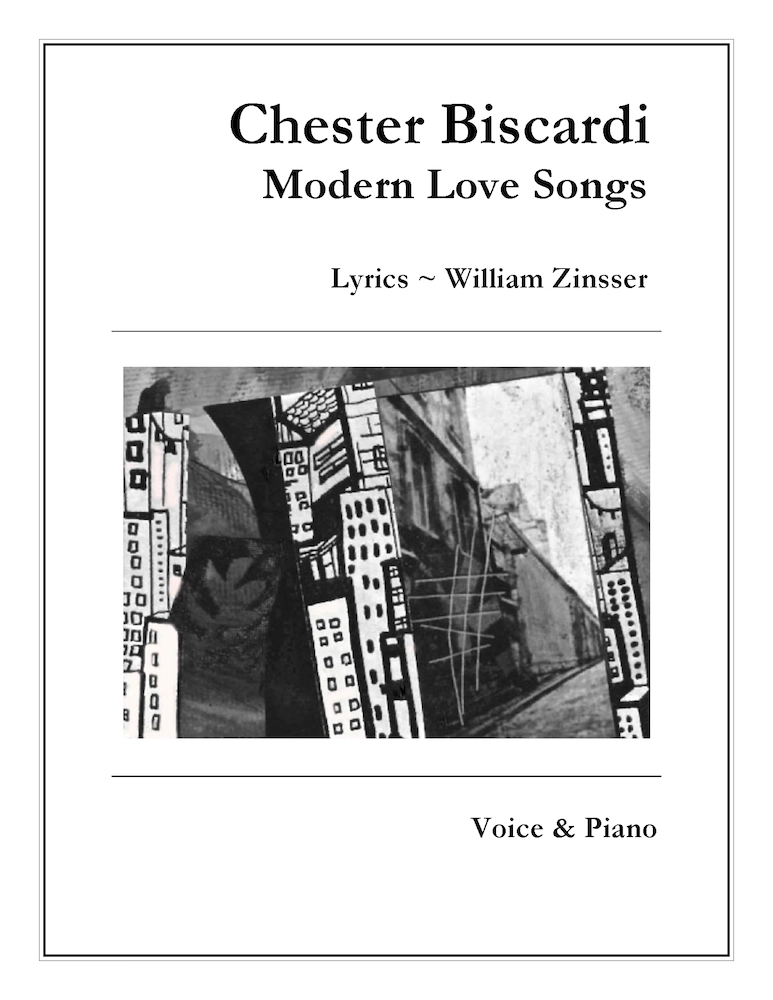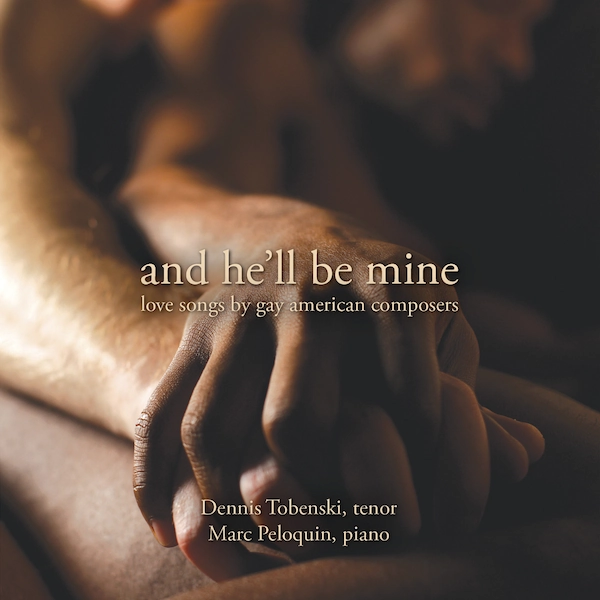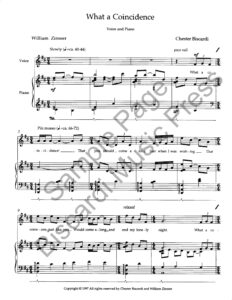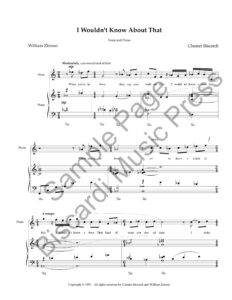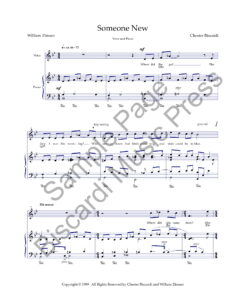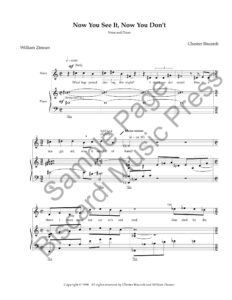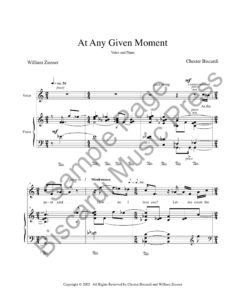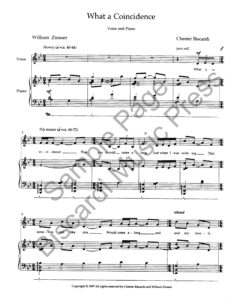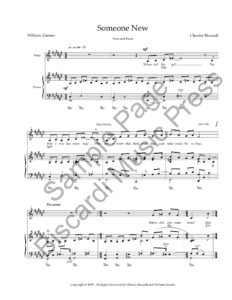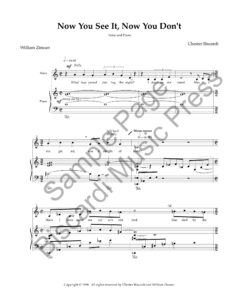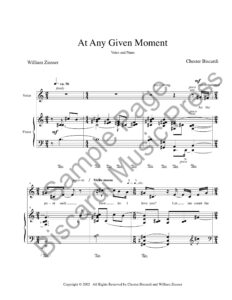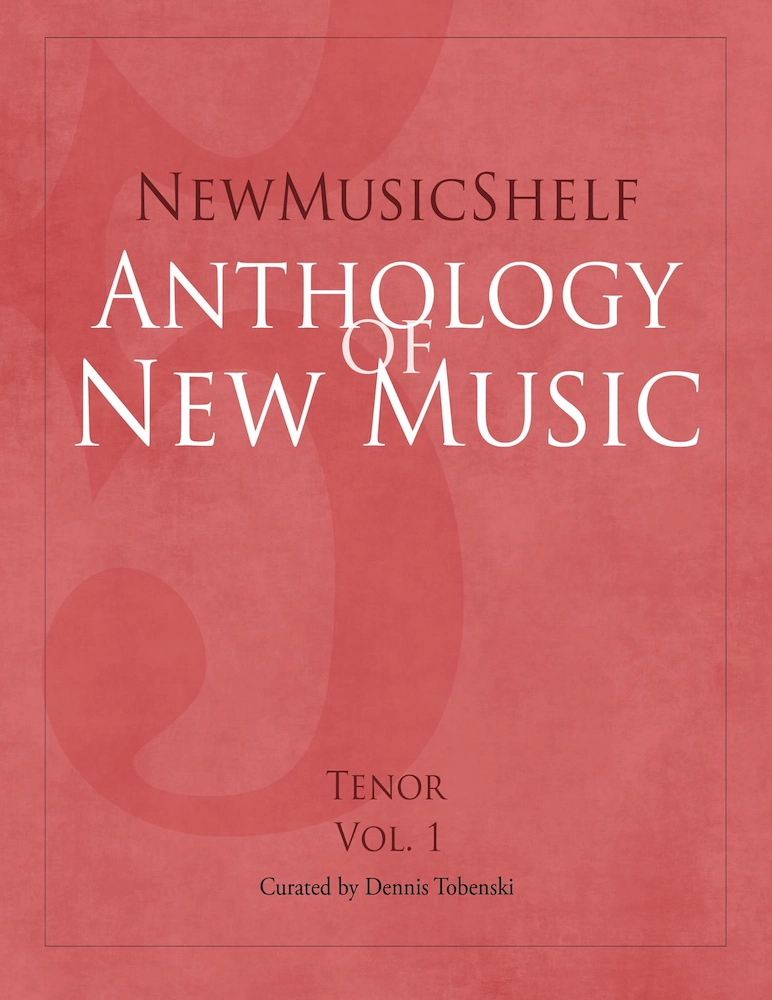“This is a deeply compelling collection of superbly crafted songs that all happen to have been written by gay composers. In this day and age, that might seem like a fairly unremarkable fact hardly worth mentioning, let alone trumpeting as the headline on the cover of a CD. Then again, there continue to be reversals in the ongoing struggle for LGBT equality, and perhaps that is more than enough reason for recordings like this to be released. At any rate, there is no question whatsoever about the excellence of these songs or about the performances which they receive. Tenor Dennis Tobenski is a skillful and sensitive singer who shapes phrases and renders text with expert care. The voice itself is quite attractive if occasionally prone to slight nasality. Pianist Marc Peloquin plays flawlessly; his superb work makes an immeasurable contribution to the beauty of these performances.
Without a doubt the finest songs in this collection are the five Modern Love Songs by Chester Biscardi, composed between 1997 and 2002 to texts by William Zinsser. Composer and writer first met during jury duty, of all things, and their conversations during their break time eventually revealed their mutual love for and interest in popular song. That was when they decided that they would collaborate, and the results were spectacularly successful as well as a bit surprising. Zinsser, who died in 2015, was a highly acclaimed journalist and writer of nonfiction who is probably best remembered as the author of On Writing Well, an indispensable guide for several generations of writers, would-be and otherwise. He may not have spent much of his public professional life writing song lyrics, but he did plenty of such work in his college days, and he wrote about music with discernment and passion. (Of the 18 nonfiction books he authored, his personal favorite was The Great American Songwriters and Their Songs, as fine a book on the topic as any ever written.) He was also an able and enthusiastic jazz pianist who only began performing in public when he was in his 60s. And his collaboration with Biscardi may have been at least part of the inspiration for his 2002 musical revue What’s the Point?, for which he crafted both lyrics and music.
Biscardi and Zinsser decided from the start that they wanted the songs they were going to write to fall somewhere between the worlds of art songs and cabaret songs, and that is precisely what they created. They fall easily upon the ear and are entirely accessible and comfortable, but there is a level of complexity and craftsmanship that elevates them beyond the realm of popular song. Biscardi makes special note of the asymmetrical construction of the lyrics and the sophisticated use of unconventional rhyme that seem to have inspired the composer to produce some of the most arresting music of his career. The opening song, ‘What a Coincidence,’ is probably the most conventional of the five, but it’s still a masterful creation that proves the power of understatement when it’s done just right. ‘I Wouldn’t Know About That’ explores how real life love does not always align with the kind of love fancifully described or depicted in poetry and film. It’s a complicated text but Biscardi’s setting is breath- taking for its natural ease, and it also manages to soften the sarcastic edge of the text, ever so slightly. ‘Someone New’ is a breathtaking depiction of how someone can find himself utterly transformed in the act of falling in love. ‘He chased away the other me,’ says the singer, ‘and brought in someone new.’ Beneath the languid surface of the song is a quietly churn- ing passion generated by Biscardi’s brilliant use of harmonic tension. It’s nothing less than a masterpiece. ‘Now You See It, Now You Don’t’ finds the singer lightheartedly trying to come to terms with emotional abandonment, but we can sense the real pain behind the brave facade. The set ends in stunning fashion with ‘At Any Given Moment,’ in which the lyrics suggest that we discard the question ‘How do I love thee?’ in favor of ‘When do I love thee?’ The answer to that question is a radiant outpouring of passion and devotion: ‘At any given moment . . . of any given hour . . . of any given day . . . you are somewhere in my heart.’ Those are words of breathtaking beauty even apart from Biscardi’s gorgeous musical setting of them. It is safe to say that in the last half century, no more beautiful love song has been composed than this.”
—Gregory Berg’s review of And He’ll Be Mine: Love Songs by Gay American Composers in “The Listener’s Gallery” in the September/October issue, Volume 73 | No. 1, Journal of Singing (2016)
“Engaging and distinctive.”
—Anthony Tommasini, New York Times (2007)
“Modern Love Songs, five settings lyrics by William Zinsser, represents a new direction by Biscardi, an amalgamation of cabaret, standard song, and art song styles in a refreshingly innovative, individual approach. Perhaps somewhat more immediately accessible than The Gift of Life, these five songs nonetheless demonstrate considerable compositional sophistication and care in the union of word and tone. The beginning piece, ‘What a Coincidence,’ is cabaret pure and simple, in straightforward AABA form. The insistent opening melody recurs throughout, and its materials govern the musical explication of this haunting little song. ‘I Wouldn’t Know About That,’ following the rather conversational nature of its opening, is a little more complex in form and style, with longer vocal lines and interesting countermelodies in the piano. ‘Someone New’ also shows cabaret leanings, but not nearly so pervasively as in the first song. As in much of Biscardi’s music, the interval of the second pervades this song; even in the middle section, the characteristic minor seventh may be seen as simply an inverted major second. The final two pieces, ‘Now You See It, Now You Don’t’ and ‘At Any Given Moment,’ lie more deeply in the art song genre. Interestingly, especially because Modern Love Songs is not a cycle, a minor third dominated motive in the former also appears in the latter.”
— Richard Dale Sjoerdsma, Journal of Singing (2008)
“While most of his vocal pieces are in the art song and operatic vein, his set Modern Love Songs and his individual song ‘Chez Vous’ contain beautiful melodies and heartfelt sentiments that characterize great standards. Composed in the classical technique with moderately complex contemporary harmonies and rhythms, these selections easily can be performed in art song or cabaret style.”
—Eric R. Bronner, Journal of Singing (2007)
“This set of songs is in quite a different style from the first six songs above [reviewed on p. 111 of the same review] and is the most successful composition from the standpoint of the vocal line in general and text setting in particular. Allowing his fondness for the music of George Gershwin and American popular song to enter the compositional picture completely changes the dissonant soundscape and loosens the strictness that results from dealing primarily with musical materials rather than with poetry. The composer says that the cycle ‘sits somewhere between cabaret/standard tunes and art songs’ (‘Composer’s Thoughts’), and so it does.
The poems, couched in immediate, everyday language, begin with awakening love and end with final disappointment. The vocal line is rhythmically conversational and without extreme vocal demands. The piano part mostly doubles the vocal line, but is musically more complex in texture, rhythms, and form than the usual popular song accompaniment. There are numerous expressive markings to indicate a freer style and enough latitude in the piano part for the singer to take whatever expressive liberties are needed to give the songs appropriate word stress and a relaxed feeling.
These songs would be a nice choice for a mezzo soprano or baritone looking for something accessible to an audience, yet having elements of the art song.”
—Judith Carman, “New Songs by American Composers: Chester Biscardi,” Music Reviews, Journal of Singing (September/October 2008)
